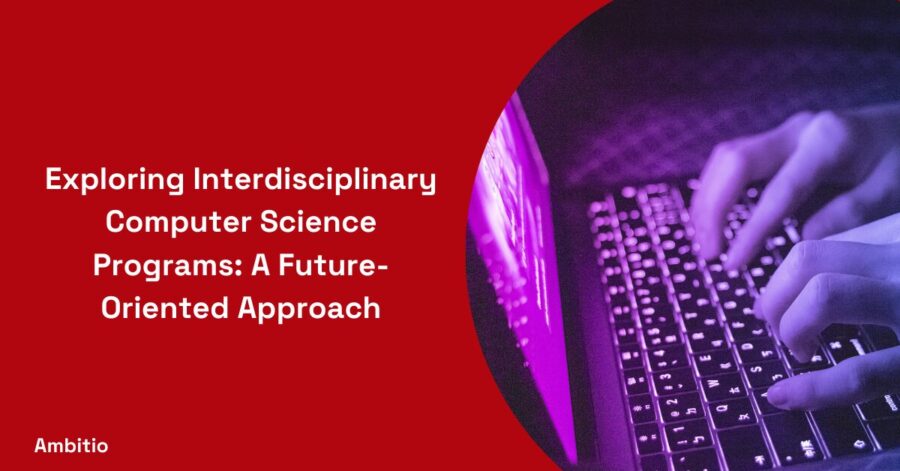12 December 2024
6 minutes read
Exploring Interdisciplinary Computer Science Programs: A Future-Oriented Approach

Introduction
In today’s rapidly evolving technological landscape, interdisciplinary computer science programs have emerged as a pivotal educational model.
These programs, integrating computer science (CS) with various scientific disciplines, are reshaping how we approach both education and problem-solving in the digital age.
Institutions like MIT have been at the forefront of this educational revolution, offering students a unique blend of computing and other scientific domains.
The emergence of interdisciplinary computer science programs reflects a broader shift in the academic and professional worlds. As technology becomes increasingly embedded in every aspect of life, the traditional boundaries between disciplines are blurring.
These programs represent a response to the growing demand for professionals who are not only skilled in computing but also possess a deep understanding of other scientific domains.
Whether it’s computational biology, digital humanities, or environmental science, the integration of computer science with other fields is opening new frontiers in research and innovation.
The Rise of Interdisciplinary Computer Science Programs
Bridging Computer Science with Sciences like Biology and Physics
Interdisciplinary computer science programs are uniquely positioned at the intersection of traditional computing and other scientific disciplines such as biology, physics, and mathematics.
These programs go beyond the core elements of CS, incorporating aspects like data structures and algorithms into diverse scientific inquiries. For undergraduates, this presents an opportunity to delve into computational methods applied in various scientific fields.
At the heart of these programs is the idea that computing is not just a standalone discipline but a fundamental tool that can enhance our understanding of the world.
For instance, in computational biology, students learn how to use algorithms and data structures to analyze and interpret biological data, leading to breakthroughs in genetics and molecular biology.
Similarly, in physics, computer science techniques are used to simulate complex systems and solve problems that are otherwise intractable.
These interdisciplinary approaches are not just academically enriching; they also have practical applications. By understanding both the science and the computational methods, students are better equipped to tackle real-world problems, from modeling climate change to designing new pharmaceuticals.
Degree Requirements and Electives in Interdisciplinary Programs
Interdisciplinary computer science programs offer a unique blend of core and elective courses that combine the rigors of computer science with other scientific disciplines. Here’s a detailed look at the degree requirements and elective options typically available in these programs:
Core Computer Science Courses
- Introduction to Programming: Fundamental concepts of programming, including data types, control structures, and basic algorithms.
- Data Structures and Algorithms: Advanced programming concepts focusing on the design and analysis of data structures and algorithms.
- Computer Systems and Architecture: An overview of computer systems, including hardware, operating systems, and low-level programming.
- Software Engineering: Principles of software development, including design, testing, and project management.
- Database Systems: Key concepts in database design, implementation, and management.
Foundational Courses in a Chosen Scientific Field
- Basic and Advanced Mathematics: Courses in calculus, linear algebra, and statistics, essential for understanding computational methods.
- Science-Specific Foundations: Depending on the chosen field, foundational courses in biology, physics, chemistry, environmental science, etc.
Elective Courses
- Machine Learning and Artificial Intelligence: Advanced topics in AI and machine learning applications.
- Bioinformatics: Application of computational techniques in analyzing biological data.
- Environmental Modeling: Using computer models to study and predict environmental changes.
- Computational Neuroscience: Studying the brain and nervous system through computational methods.
- Quantum Computing: Exploring the principles and applications of quantum computation.
- Robotics and Automation: Understanding the design and programming of robotic systems.
- Digital Humanities: Applying computational methods to humanities subjects like literature, history, and art.
- Health Informatics: The use of IT and data to improve healthcare delivery and outcomes.
Research and Practical Experience
- Capstone Project: A final project where students apply their interdisciplinary knowledge to solve real-world problems.
- Internships/Co-ops: Practical work experience in industry or research settings, often integral to the program.
- Independent Study or Research: Opportunities for students to explore specific interests under faculty guidance.
General Education and Soft Skills
- Communication Skills: Courses in writing and oral presentation to enhance students’ ability to articulate complex ideas.
- Ethics and Society: Understanding the ethical implications of technology in society.
- Teamwork and Collaboration: Focusing on collaborative skills essential for interdisciplinary work.
These degree requirements and electives ensure that students not only gain a strong foundation in computer science but also develop a versatile skill set that can be applied in various scientific domains.
Through this comprehensive curriculum, students are well-prepared for both advanced studies and diverse career paths in the ever-evolving world of science and technology.
The Structure of Interdisciplinary Computing Majors
The Role of Mathematics and Computational Science
Mathematics is a cornerstone in these interdisciplinary programs, often intertwined with computational science and engineering. Courses in mathematics and computing help students develop the analytical skills necessary for tackling complex problems in various scientific domains.
This integration is evident in departmental offerings, where mathematics courses are an integral part of the curriculum. The role of mathematics in these programs cannot be overstated. It provides the foundational language and tools for computational thinking.
Students learn not only how to write code but also how to apply mathematical concepts like linear algebra, calculus, and probability to solve computational problems.
This dual focus ensures that graduates are not just proficient coders but also have a deep understanding of the theoretical underpinnings of computing.
Furthermore, mathematics courses often include elements of computational science, such as numerical methods and algorithmic thinking. These skills are essential for students aiming to apply computer science in other scientific fields.
For example, in computational biology, numerical methods are used to model complex biological systems, while in physics, algorithmic thinking is essential for simulating particle interactions.
Undergraduate Study and Research Opportunities
Undergraduate study in interdisciplinary computer science programs often includes opportunities for research and collaborative projects. These programs encourage students to engage in interdisciplinary research, applying computational methods to fields like genomics, neuroscience, and digital media.
This hands-on experience is vital for students who want to pursue doctoral studies or careers in emerging scientific domains. Research opportunities in these programs often involve working closely with faculty members on cutting-edge projects.
For example, students might participate in research on machine learning applications in healthcare, or they could contribute to a project on environmental data analysis.
These experiences not only enhance students’ understanding of the subject matter but also develop their skills in problem-solving, critical thinking, and collaboration.
Moreover, many programs encourage or even require students to engage in internships or cooperative education experiences. These real-world experiences are invaluable, providing students with a glimpse into how interdisciplinary skills are applied in industry and research settings.
Whether working in a tech company, a research lab, or a non-profit organization, students gain practical experience that complements their academic studies.
The Future of Interdisciplinary Programs in Computer Science
Preparing Students for a Multidisciplinary World
These programs are designed not just to impart technical knowledge but also to prepare students for the multidisciplinary nature of modern scientific inquiry and industry demands.
From computational biology to software engineering and data visualization, the programs equip students with a diverse skill set, enabling them to navigate and contribute to various fields effectively.
In the future, we can expect the boundaries between computer science and other disciplines to continue blurring. As such, interdisciplinary programs will become increasingly important.
They not only prepare students for careers that currently exist but also for roles that will emerge in the future. For instance, as our understanding of climate change deepens, there will be a growing need for professionals who can combine computer science with environmental science to develop sustainable solutions.
These programs also foster a mindset that is essential in today’s world: the ability to think across disciplines, to see connections, and to innovate at intersections.
This interdisciplinary mindset will be key to solving many of the complex challenges facing our world, from managing global health crises to advancing renewable energy technologies.
Collaborative Learning and Real-world Applications
Interdisciplinary computer science programs emphasize collaborative learning, bringing together students and faculty from different academic disciplines.
This approach fosters a rich learning environment where students can apply computational methods to real-world problems, gaining proficiency in areas like computer vision, software design, and problem-solving.
Collaborative learning in these programs goes beyond the classroom. It extends to research projects, hackathons, and team-based assignments where students from various backgrounds come together to solve complex problems. This not only enhances the learning experience but also prepares students for the collaborative nature of the modern workplace.
The real-world applications of what students learn in these programs are vast. For instance, in computer vision, students might work on projects related to autonomous vehicles or facial recognition technology.
In software design, they could develop applications that address social or environmental issues. By working on these practical applications, students gain a deeper understanding of how interdisciplinary knowledge can be used to make a tangible impact on the world.
Conclusion
Interdisciplinary computer science programs represent a significant shift in higher education, reflecting the interconnected nature of science and technology in the 21st century.
By blending computer science with other scientific disciplines, these programs are preparing a new generation of innovators and problem solvers, capable of making significant contributions across a spectrum of fields. The future of education and industry lies in breaking down silos and fostering interdisciplinary collaboration.
Programs that integrate computer science with other fields of study are leading this charge, equipping students with the knowledge, skills, and mindset needed to thrive in a rapidly changing world. As these programs continue to evolve, they will play a crucial role in shaping the future of technology, science, and society.
FAQs
What are interdisciplinary computer science programs?
Interdisciplinary computer science programs combine the study of computer science with other scientific disciplines, offering a comprehensive education that spans multiple fields of science and technology.
What can students expect from these programs?
Students can expect a blend of core computer science courses with electives and research opportunities in various scientific fields, from biology and physics to neuroscience and computational biology.
Why are these programs important?
These programs are crucial in preparing students for the multidisciplinary nature of modern scientific inquiry and the demands of a technology-driven world, equipping them with diverse skills and knowledge.
What are some potential career paths for graduates?
Graduates can pursue careers in areas like software engineering, computational biology, data science, research, and academia, among others, depending on their specific interests and studies.

You can study at top universities worldwide!
Get expert tips and tricks to get into top universities with a free expert session.
Book Your Free 30-Minute Session Now! Book a call now




























